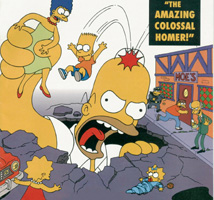home | metro santa cruz index | news | santa cruz | news article

Classics Illustrated: Why anyone would need an academic to understand Homer is a mystery to us.
Classicist Invades Nightclub!
Paul Lee brings his nuanced observations on Homer and Socrates to the Attic
By Laura Mattingly
Paul Lee is UCSC's former, self-proclaimed "psychedelic professor," with all the answers to any questions one might have concerning how Western civilization got so messed up.
Once upon a Homeric time, humans identified with nature, and with each other, until development of a centered self. Then someone had to come along and invent the soul. "How do you explain this domination of male over female for the last 200 years? And this press on rational self-consciousness? It's a power struggle. And it's only come to light within the last 50 years."
Who's the culprit? Socrates, says Lee. He'll tell you all about it at "The Attic Humanities Series: Dinner Theater of the Mind," Jan. 11 and 25, an opportunity to "feed your head."
"What's most interesting to me," says Lee, "and I picked this up at Harvard because Harvard was the center for it, was the transition from oral to literate cultures. Homeric is oral, see, no writing, no reading. It's pre-literate, pre-rational. It's a tribal culture and everything is communicated by word of mouth, largely through the poems. So you have to move from Homer to Plato, through Socrates, to get to rational literacy, and it's a huge revolution, actually."
And as Lee describes it, the development of the Socratic-self veers an entirely different direction from the Homeric world that preceded it. "It's the evolution of the culture. If you have a tribal mentality ... the self is embedded in the natural order so much that everything sort of flows together."
Lee says this strong, seamless identification between self and nature explains the famous Homeric similes, stanzas jumping from human imagery to natural imagery without explanation, between "the army coming down" and "a swarm of bees."
"So in a way, the Homeric hero doesn't have a soul," says Lee, "if you take that to be the term for the centered self. And that's what Socrates is credited with discovering, is the soul."
With the development of the centered self comes the individual's sense of separation from nature and from others. This distance becomes the key ingredient paving a long road of rational, systematic, science-driven culture.
"Subject/object sat on a wall, subject/object had a big fall, and all the king's horses and all the king's men, couldn't put subject/object together again," says Lee. "So this kind of dreaming innocence of the Homeric world, where everything is related to everything, gets split." In Lee's view, the birth of rational thought led directly to the constant and widespread oppression of women in the Western world, the dysfunction of a purely technical society and the inevitable destruction of that society. Even so, Lee believes in the importance of understanding the texts of Homer, Plato and Socrates as the foundation of contemporary thought and culture, and he bemoans the transition in American universities toward phasing out the "dead white guys" in lieu of what he sarcastically generalizes as "the American Indian in Film."
Metro Santa Cruz asked Lee if he feels Homer is more valuable than the newer, more eclectic curriculum. "Fuckin' A, are you kidding? Please! It's the foundation of Western culture! OK, if you wanna pooh-pooh that, there's not much to say."
'One Night University: Homer,' Thursday, Jan. 11, and 'Socrates,' Jan. 25, at 6:30pm at the Attic, 931 Pacific Ave., Santa Cruz. Tickets $10; 831.469.3384.
Send a letter to the editor about this story.
|
|
|
|
|
|